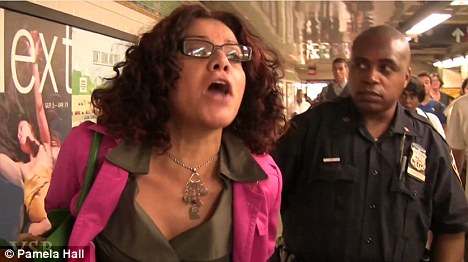“Must the citizen ever for a moment, or in the least degree, resign his conscience to the legislator? Why has every man a conscience then? I think that we should be men first, and subjects afterward. It is not desirable to cultivate a respect for the law, so much as for the right. The only obligation which I have a right to assume is to do at any time what I think right.” – Henry David Thoreau
Oh, my friends saying that Mona Eltahawy doesn’t understand the First Amendment and American protest, you’re right. But, thus far, neither do you. The issue is that Eltahawy was committing criminal mischief during her speech act, with the presumption this negates what she did as non-violent protest and speech act. But crime has always been part of protest in America, since before it was these United States. And of course Eltahawy didn’t violate anyone else’s free speech. The reason she will be charged with vandalism and not violating the First Amendment is that only the State can violate the First Amendment.
An act can be non-violent protest and speech while committing a crime, and civil disobedience requires that you commit a crime — that’s what makes it disobedient. When people sat in at counters, blocked bridges, sat in the front of the bus, defied Jim Crow, burned draft cards, blocked mines and factories owned by other people, got escaped slaves to Canada, threw tea in the harbor, sat down on a cop car in Berkeley, DDOSed Polish gov websites, and put up tents in defiance of the courts, they were breaking the law. They set out to break the law. Their bodies were their critique of society, sometimes of the law, sometimes of the prevailing morals. When Mona Eltahawy sprayed that poster she was offering her body as a critique of racism, though the video suggests she didn’t understand she was doing that. When you chain yourself to tree, block an abortion clinic, or refuse to leave the Oakland street after a dispersal order, you expect to confront the legal system. That’s part of the deal — a rich American tradition of getting your ass arrested and punished for standing up for what you believe. Equal application of the law means Eltahawy had to get arrested, but there is no reason she shouldn’t call for everyone to spend a night in jail for defacing a racist poster. Speech even protects those who say you shouldn’t pay taxes, that women should be raped, and that you should go ahead and play Blackjack in Utah if you want to.
That Eltahawy believed her protest meant she shouldn’t be arrested is a misunderstanding of vandalism, not free speech. To get arrested protesting racism, it’s a powerful protest. That she played it up — also the point of going so far as to get arrested. If you are going to go to that length for what you believe in, it’s pretty ridiculous to do it as quietly and shyly as possible.
Even American cops are in on the game. During various Occupy actions this year and last, there were many times police would announce moving into the arrest phase of clearing or breaking up an action, and let the protestors choosing to be arrested prepare themselves, chat with friends, pass along phone numbers and personal items, and then get respectfully arrested as a declared act of civil disobedience. It’s a normal part of American civil life.
Without law breaking, law doesn’t progress. Law needs to be broken to adapt to changing times. The best things in the American legal system are the things that change and grow, and they do this by being pushed hard. Does this mean we should restrict free speech? I’d say no, but obviously there’s a conversation to be had here, and Eltahawy points out with her body, as do the Muslim protestors around the world with their bodies, that we who believe in free speech need to explain it better. The other side of Eltahawy’s action, that we should go to jail to oppose racism — I might very well be ok with that. I don’t think if we’re caught we shouldn’t get arrested, tried, and convicted of crimes. I think the law should continue to allow shitty ass losers to put up racist pieces of shit, like they did in New York, and on bus ads in San Francisco. And I think they should all be defaced in minutes. Those who do the defacing should make careful choices between getting arrested and not getting caught. But I’m proud of the San Franciscans that quietly fucked over the same ads on Muni buses and didn’t get caught, and I’ll be proud of Eltahawy when she sees getting arrested and not only a valid part of her protest, but the most valid part. “This is what happens in America when you non-violently protest,” said Eltahawy — and that’s an awesome part of protest.
Since when are Americans the type that believe law dictates what’s right? We are a people born and raised dictating to law, even when we have to put our bodies, freedom, and safety on the line to do so. We are people who put our bodies on the line to tell people they have to stop being shitty. I like that about us, and my friends do too, even if they’re not seeing it in Eltahawy’s case. That she didn’t say the right thing doesn’t mean she didn’t do the right thing, whether accidentally or on purpose.
Update: Eltahawy responded on Twitter to this piece, saying: “Quinn I’m proud I was arrested. I very much see what I did as non-violent civil disobedience. I’ve said that on all media I do.”
